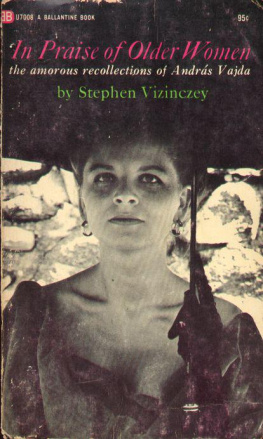Note to the Reader
T here was a particularly dramatic nine-year period in my life when I was working in the psychiatric emergency room at Bellevue Hospital, surrounded by other doctors, nurses, hospital personneland insanity.
Though I have done my best to portray this time in writing, it is impossible to do Bellevue justice, and I knew that from the start. Everything you will read in this book actually happened, but the Bellevue experience is unique and cannot adequately be captured by any one persons interpretation. My minds eyes version of the events will of course differ from someone elses.
Due to the sensitive nature of the circumstances, I have changed some of the identifying details to protect peoples privacy, and I have changed the names of all of my colleagues and patients, except for those who have appeared in the news. Also, the chronology of some events may have been condensed, dragged out, or rearranged, but if I make a point of saying how busy it was on a given night, then I have not inflated the numbers, and if I mention what a coincidence it was that two things happened simultaneously, then they did.
The dialogue in Weekends at Bellevue was often transcribed virtually word for word, from notes I wrote when I got home, which I did to help exorcise the demons of the previous two days at work. When I didnt have the benefit of working from detailed notes, I tried to preserve the gist of what was said, but cannot claim to have reconstructed every conversation verbatim.
For simplicitys sake, I have tended to use he instead of he or she for third-person references that are not specific. Please forgive this; it just makes for easier reading.
I want to thank each patient, doctor, nurse, social worker, hospital police officer, New York City cop, ambulance driver, and federal agent with whom I ever came into contact during my nine years at Bellevue. If you have ended up in this book, please do not take offense. I never meant to betray your confidences, only to enlighten others with educational or entertaining stories. And we had some laughs, didnt we?
I have learned so much from my patients over the years. The purpose of this book, above all, is to share what I have learned, in the hopes that it may help people to understand some of what I feel is the human condition in psychiatric medicine. I am deeply grateful to all whose lives were shared with me, and who will now help in the process of educating others.
One thing needs to be explicitly clear: This is a skewed sampling of patients. Inevitably, the people whom Ive chosen to write about were more colorful, dramatic, provocative, or violent than the average Bellevue patient. The vast majority of people living with psychiatric symptoms are scattered among us, are us, the walking wounded, and do not tend toward violence or addiction. But when I came home Monday morning and wrote down my recollections of the events of the preceding weekend, it was not to tell the tales of the garden-variety depressed or anxious patients. They, like the more seriously ill patients, deserve our tender ministrations, but I knew they wouldnt be as compelling to write or read about.
Bellevue is a great hospital that does great work, and I am proud to have been a part of this noble institution.
Mother Natures Son
O n a warm day in early spring, two New York City cops and two EMS workers roll a gurney down the hallway, escorting a man to the entrance of Bellevues psychiatric emergency room, where I work. Lying on the stretcher underneath a white sheet, with a head of dirty blond hair beaded and dreadlocked, he is naked, sunburned, and screaming. I walk out to greet my new patient as the drivers hand me his paperwork to sign.
Whatd you bring me? I ask eagerly. I can see hes a live one. I love the live ones.
Over the shrieking, one of the EMS guys gives me the bullet, the few pieces of relevant information when introducing a patient to a doctor: age, chief complaint, pertinent history. This is Joshua Silver. Twenty-three. No significant medical history, no allergies, no meds. Also, he denies a psych history, he says archly, shooting me a look.
And howd he get to you guys? Who called 911?
NYPD called in an EDP. This is cop-talk for a psychiatric patient: emotionally disturbed person. Hed taken off his clothes in Times Square and was parading around, barking like a dog. And growling, he adds.
This gets the patients attention, and he interrupts the driver to clarify, It was my way of showing them that I was not an animal. I am not a dog!
Barking and growling to prove he is not a dog? His logic is lost on me, but at least hes stopped yelling and started communicating.
You can talk to me, I say, turning my full attention toward him.
See, there were some guys from Nation of Islam preaching on the corner, and they told a woman who was arguing with them that she was just a dogGod spelled backwardsto which I took offense. He then explains to me, as he did to them, that all people are art. Thou art art, I told them. Once you accept that all people, all objects, are art, you will live in heaven as I do.
You know what, Joshua? I ask, having decided it is time to move out of the triage area and into the locked area. I think you and I should go talk about this inside. I want us to sit in an interview room so I can try to get some more history, and I dont feel like standing over him while he lies on a stretcher. I can already tell hes an admission and will need to be in the detainable area for patients awaiting beds upstairs.
I let EMS and NYPD know that they are free to leave, and I grab my new patient some hospital pajamas. I help him off the stretcher, wrapping his sheet around him, and walk him into the larger, locked part of the ER. As I escort him through the entrance, the door clicks definitively behind us, and I hope he doesnt notice that he is now locked in. Because he is naked, we can dispense with the contraband search, which is good. The search is often the point where people become uncooperative and agitated, ending up restrained and medicated.
Prior to entering the detainable area, a patient must remove his belt, shoelaces, rosary beadsanything that can be used to hang himself or choke a fellow patient. Inevitably, the patient will insist that he is not suicidal or dangerous, but it doesnt matter; these items are not allowed in the detainable area. Neither are cell phones, crack pipes, backpacks, knives, pens, wallets, and the list goes on. The patient has to give up just about everything along with his freedom.
Luckily, Joshua is oblivious. I show him to the bathroom where he puts on the pajamas quickly. I alternate between keeping an eye on him and setting up the interview room. There are several windowed rooms within the detainable area, each with a desk and two chairs. I put my chair closer to the door. As we settle into our talk, the first thing I notice is that although he is disheveled, he seems well-educated with an impressive vocabulary. He tells me he has written a twenty-eight-page manuscript, which he calls a prose-poem, based on his newly embraced credo that everything is art. He is hoping to reach millions of people by delivering his manifesto on the Howard Stern show on K-ROCK, a radio station in the city.
I am a holy man, he tells me, explaining how his writing has elevated him to this level. I feel like King Arthur in a tower of Babel. He is hyper-verbal, spewing non sequiturs. I try to keep up with him, playing follow the leader, as if we are hopping from rock to rock in a rushing stream, but he is pulling far ahead of me. Eventually, I have to tell him hes not making a lot of sense.





